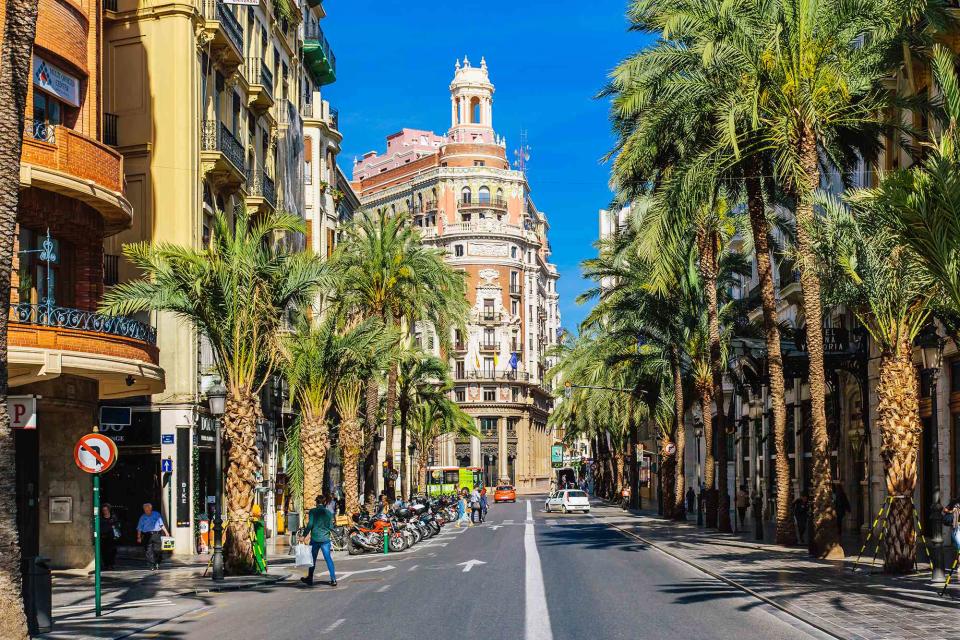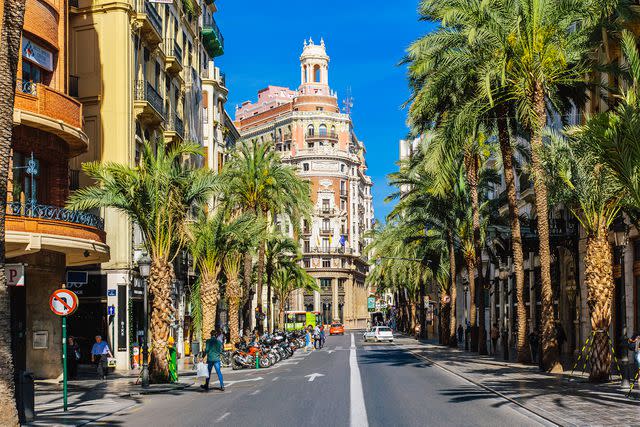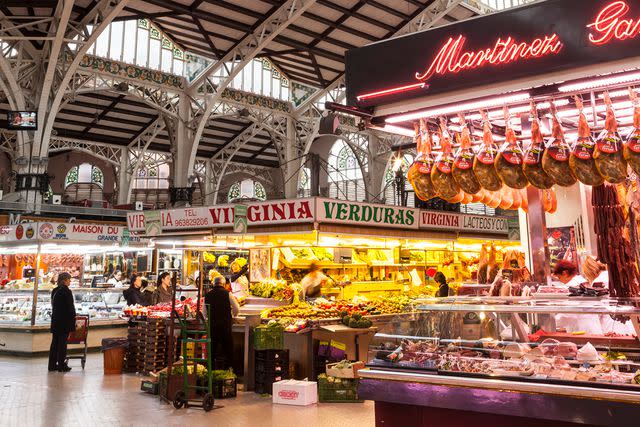This Spanish City Is the Birthplace of Paella — and It Gets 300 Days of Sunshine a Year
Here’s how to plan the perfect trip to Valencia.

Alexander Spatari/Getty Images
Often overshadowed by Barcelona and Madrid, Valencia has a ton to offer visitors in the way of history, gastronomy, and recreation. Arguably best known as the birthplace of paella and home to a striking cultural center, this palm-lined port on the southeastern coast of Spain is one of those rare destinations that celebrates old and new in equal measure. It boasts a wealth of interesting museums and emblematic landmarks, and the city buzzes with creative energy and was named the World Design Capital in 2022. And, of course, the futuristic Ciudad de las Artes y las Ciencias ranks among the most beautiful places to visit in Spain.

Alexander Spatari/Getty Images
As foodies will attest, the local cuisine and availability of fresh ingredients — including vine-ripened tomatoes, juicy oranges, and rice — is outstanding. With a massive central market and many excellent restaurants around the city, you certainly won’t go hungry. And because Valencia enjoys 300 days of sunshine annually and has both lovely parks and beaches, it’s also ideal for travelers who like to spend time outdoors between sightseeing and eating.
Whether you’re planning a weekend escape or a longer trip to the aptly nicknamed “City of Joy,” scroll on for our suggestions to maximize your time in Valencia.

Vladone/Getty Images
Best Times to Visit Valencia
Valencia is a fantastic city to visit at any time of year. Sure, picture-perfect summer weather brings more beachgoers in the warmer months, but the treasure trove of cultural attractions, delicious food, and mild climate sustains tourism throughout the year.
Best Things to Do in Valencia
Valencia brims with historic attractions. Luckily, it’s also super walkable, making it easy to hit many of the must-see spots in a relatively short time. Kick things off in the medieval old town, a warren of cobbled streets with cafés, artisan shops, and eye-catching architecture. La Lonja de la Seda (the Silk Exchange), Valencia Cathedral, and Mercado Central are some of the most iconic buildings in the area. Travelers interested in the past should also visit San Nicolás de Bari y San Pedro Mártir, Plaza de la Virgen, and Torres de Quart.

Alessandra Amodio/Travel+Leisure
Voted one of the 12 Treasures of Spain, Ciudad de las Artes y las Ciencias tops the list of must-see modern sights. Designed by local architect Santiago Calatrava, the striking complex features a ship-shaped opera house, IMAX dome theater, interactive science museum, open-air art gallery, and the largest aquarium in Europe.
The magnificent Turia Gardens — an expansive park on the former riverbanks — covers grassy lawns, gardens, fountains, bridges, playgrounds, and multi-use pedestrian pathways. It’s also a short car or bus ride to Playa de la Malvarrosa. Locals and visitors pack the sandy stretch during the summer. Though, you’ll notice folks working on their tan, sipping drinks, and playing volleyball anytime the weather is nice (so, basically always). Bioparc Valencia recreates different natural habitats, so parkgoers get to witness what it would be like to see animals in the wild versus a normal zoo setting.

Rafa Elias/Getty Images
Best Places to Eat and Drink in Valencia
Paella was born in Valencia. While there’s certainly no shortage of places to savor Spain’s national dish, a handful of names stand out from the rest. A 100-year-old institution across the street from Playa de la Malvarrosa, Casa Carmela continues to draw crowds with its adherence to a traditional recipe passed down through generations. Don’t miss the typical Valencian paella with chicken, rabbit, and peas at Restaurante Canela. Navarro and Arrocería Maribel are other favored establishments for sampling sizzling socarrat-crusted rice dishes. The city also has plenty of tapas bars. Founded in 1836, Casa Montaña serves seasonal share plates alongside an impressive selection of wine.

Julian Elliott Photography/Getty Images
One of the largest markets in Europe and an impressive example of art nouveau, Mercado Central is a sprawling, ornate venue that’s filled with vendors selling poultry, fish, meat, snails, produce, herbs, dried fruit, nuts, olive oils, and baked goods. It’s a great spot to sample local products and regional specialties. After browsing the stalls, snag a seat at Central Bar by Ricard Camarena for Valencian tomato salad, cod fritters, and flan.
Best Places to Stay in Valencia
Valencia’s artistic zeal and design pedigree very much come through in the accommodation options. Hotel Helen Berger, a stylish boutique stay in the old town, reflects the creative spirit of its environs. It’s vibrant yet relaxed with a crisp palette, sleek furnishings, and curated art. The penthouse suite flaunts a rooftop terrace that beckons guests to hang out for a while and soak up the sun. Even if Cosmo Hotel & Bar wasn’t such a design-driven standout, people would probably still check in for the location alone. But the fact that this chic, modern bolthole wows aesthetically and feels so genuinely welcoming just gives travelers even more reasons to book. The Lázaro Rosa-Violán-designed Only You Hotel Valencia glimmers with gold details and plush velvet, while a DJ spins tunes in the lobby restaurant. Hospes Palau de la Mar, a member of Design Hotels, is a refined base to unwind for a few days with sleek rooms and a spa. There’s also the independently operated and minimally minded Caro Hotel that’s set inside a 19th-century palace.
For more Travel & Leisure news, make sure to sign up for our newsletter!
Read the original article on Travel & Leisure.

